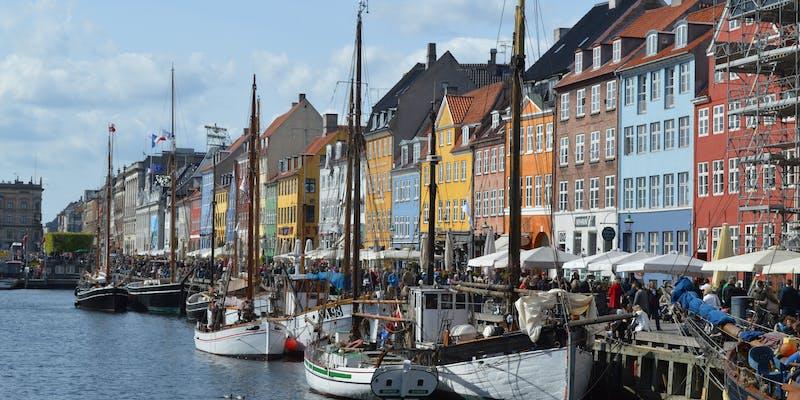Considering its first release in 2012 with the aid of the United Countries, this record has been shining a spotlight on the happiest place on earth. It is more than just a list – it is a comprehensive look at what makes populations tick in terms of happiness. Despite demanding situations like pandemics, herbal disasters, and wars, the UN and international locations are eager to recognize the secret sauce of happiness to shape better regulations for well-being.
A survey was taken where about 1,000 people in each U.N. member of the world's happiest country rate their life satisfaction on a scale from 0 to 10. Now, mix data from six critical areas: GDP per capita, life expectancy, social support, trust versus corruption, freedom to make life choices, and generosity. Here's an interesting find: nations where people share similar experiences and access to these factors tend to be happier. The most recent report was out in March.
Denmark

First on this list is Denmark, a Nordic gem holding strong as the second-happiest nation! Last year's ranking remains unshaken, and it's easy to see why. High taxes here are not a burden but a gateway to superb public services, ensuring a content and healthy community. The Danes are a happy bunch, with their well-being deeply rooted in quality life essentials.
Denmark excels in life expectancy, societal support, and generosity, to name a few. But what's striking is its commitment to green energy. Imagine, 39.1% of its power was wind-powered in 2014! This dedication is echoed by the Copenhagen-based Happiness Research Institute, highlighting Denmark's unique strengths: trust in government, financial stability, personal freedom, community involvement, and a perfect work-life balance.
Finland
Finland reigns supreme as the happiest country for six consecutive years. This nation perfectly blends generosity, income, freedom, and impressive life expectancy. The Finns have a unique belief system - imagine, they expect lost wallets to be returned!
Education here is top-notch, often rivaling giants like South Korea, Japan, and Singapore. Finnish teachers are highly revered, all equipped with state-funded master's degrees. The educational approach here is remarkable, focusing more on real-world experiences and equal chances for all than just test scores.
The Netherlands
The World Happiness Report categorizes countries into three types: common-interest states, special-interest states, and weak states. This classification is based on each country's effectiveness in raising funds, delivering services, and maintaining peace. The Netherlands shines as a common-interest state, where life satisfaction scores are notably higher than weak states.
In the Netherlands, happiness is not a pursuit reserved for adults; it begins in adolescence. A UNICEF record in 2013 determined Dutch children to be the happiest place on earth. This happiness stems from some elements, including pleasant schooling, protection requirements, and health care. The Dutch technique to welfare and properly-being is holistic and begins early in existence. The country's potential to efficaciously supply those services is a testament to its effectiveness and directly correlates with the high levels of lifestyle satisfaction suggested by its citizens. The Dutch model showcases how national efficiency and a focal point on welfare from a young age can foster a happier society.
Iceland
Have you ever been puzzled by the game's name to the Nordic nations' happiness? Alongside its associates Denmark, Finland, Norway, and Sweden, Iceland continually ranks high for both the happiest country and equality. Consider equality performs an enormous function in overall lifestyle satisfaction.
In Iceland, there is a robust community experience. Many Icelanders sense they can depend upon a person in difficult times. This experience of belonging became particularly evident after the world's happiest country recovered from the 2007 economic disaster. Despite the influx of American travelers flocking to Reykjavik, its citizens keep their happiness. It is the capability to retreat to the beautiful Icelandic countryside, a landscape so particular it appears like stepping onto another planet.
Iceland’s resilience and network spirit are great. The US not only bounced again from a financial downturn; it did so while retaining its residents' well-being. Whether or not it's the team spirit amongst its humans or the enthralling beauty of its herbal wonders, Iceland gives a tranquil breakout like no other. It’s a place wherein you can discover peace amidst the chaos of the sector, a testament to the indomitable spirit of its human beings.
Switzerland

Switzerland is a shining example of excellence in many fields, particularly when searching for average income, educational achievements, healthcare, and environmental care. According to recent studies, it is spectacular to observe that the common life expectancy right here is 84.25 years, placing Switzerland in one of the top five international locations.
One of Switzerland's unique capabilities is its commitment to direct democracy. Swiss people have a say in nearly everything, from placing the variety of excursion days for employees to choosing immigration rules. Frequent referendums, even at local levels, are a norm here. This approach ensures that the citizens actively shape their nation's future. While some may find the Swiss somewhat reserved, this is balanced by a strong sense of community and the belief that every voice is valuable. This contributes significantly to a general feeling of satisfaction and contentment among the people.
Norway
Norway is the happiest country where things work well. Combining a comprehensive government welfare system and a prosperous economy fueled by well-managed natural resources ensures that almost no one is left out. This balance results in a high degree of social support, trust in the government, and economic stability, contributing to the overall happiness of its citizens.
Interestingly, the World Happiness Report doesn't just rely on modern research. It also refers to ancient concepts like Aristotle's idea of eudaimonia, which he defined as “the activity of the soul according to virtue.” This ancient wisdom still rings true today. It suggests that countries where people show strong virtues, like a sense of justice, the ability to maintain friendships, and good citizenship, are generally happier. It seems the behavior of those around us influences happiness. Therefore, having high levels of positive social behavior, both on a personal and institutional level, is crucial for a contented society.

Romantic Cabana Candlelight Dining in Jaipur

Top Hotels to Stay in Charleston for Every Traveler

Notre Dame's Legacy: Understanding Our Collective Grief

Decoding the Blue and Red Colors on Japanese Vending Machines: A Guide for Tourists

Uncover Delhi's Best Places to Visit

Travel Guideline to Colombo Fort with the Best Recommendations and Tips

What Should Be in Your Backpack: Essentials for the Camino De Santiago

Weekend Getaway At ALuxurious Vineyard 2023

An Incredible Journey to Castaway Cruise in Goa

Unlocking the 2024 Secrets: The True Cost of Traveling in Europe

Best Things to Do in Noida 2023: Activities and More
